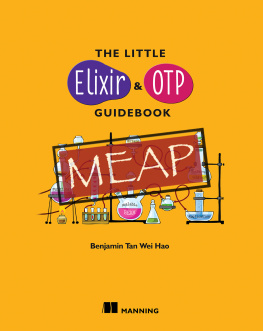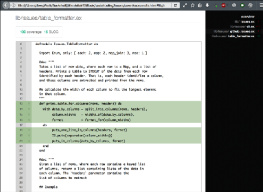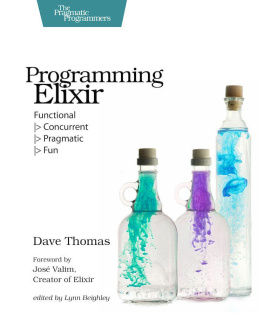Thomas - Programming Elixir: functional - concurrent - pragmatic - fun
Here you can read online Thomas - Programming Elixir: functional - concurrent - pragmatic - fun full text of the book (entire story) in english for free. Download pdf and epub, get meaning, cover and reviews about this ebook. City: Dallas;Texas, year: 2014, publisher: The Pragmatic Bookshelf, genre: Computer. Description of the work, (preface) as well as reviews are available. Best literature library LitArk.com created for fans of good reading and offers a wide selection of genres:
Romance novel
Science fiction
Adventure
Detective
Science
History
Home and family
Prose
Art
Politics
Computer
Non-fiction
Religion
Business
Children
Humor
Choose a favorite category and find really read worthwhile books. Enjoy immersion in the world of imagination, feel the emotions of the characters or learn something new for yourself, make an fascinating discovery.
Programming Elixir: functional - concurrent - pragmatic - fun: summary, description and annotation
We offer to read an annotation, description, summary or preface (depends on what the author of the book "Programming Elixir: functional - concurrent - pragmatic - fun" wrote himself). If you haven't found the necessary information about the book — write in the comments, we will try to find it.
Thomas: author's other books
Who wrote Programming Elixir: functional - concurrent - pragmatic - fun? Find out the surname, the name of the author of the book and a list of all author's works by series.
Programming Elixir: functional - concurrent - pragmatic - fun — read online for free the complete book (whole text) full work
Below is the text of the book, divided by pages. System saving the place of the last page read, allows you to conveniently read the book "Programming Elixir: functional - concurrent - pragmatic - fun" online for free, without having to search again every time where you left off. Put a bookmark, and you can go to the page where you finished reading at any time.
Font size:
Interval:
Bookmark:

Dave & Andy.
Many of the designations used by manufacturers and sellers to distinguish their products are claimed as trademarks. Where those designations appear in this book, and The Pragmatic Programmers, LLC was aware of a trademark claim, the designations have been printed in initial capital letters or in all capitals. The Pragmatic Starter Kit, The Pragmatic Programmer, Pragmatic Programming, Pragmatic Bookshelf and the linking g device are trademarks of The Pragmatic Programmers, LLC.
Every precaution was taken in the preparation of this book. However, the publisher assumes no responsibility for errors or omissions, or for damages that may result from the use of information (including program listings) contained herein.
Our Pragmatic courses, workshops, and other products can help you and your team create better software and have more fun. For more information, as well as the latest Pragmatic titles, please visit us at http://pragprog.com.
We strongly recommend that you read this book with the publisher defaults setting enabled for your reading device or application. Certain formats and characters may not display correctly without this setting. Please refer to the instructions for your reader on how to enable the publisher defaults setting.
| Assignment: I Do Not Think It Means What You Think It Means. |
| Dictionaries: Maps, HashDicts, Keywords, Sets, and Structs |
Dave Thomas has done it again. Programming Elixir is what every programming book aspires to be. It goes beyond the basics of simply teaching syntax and mechanical examples. It teaches you how to think Elixir.
| Bruce Tate |
| CTO, icanmakeitbetter.com. Author. |
In Programming Elixir, Dave has done an excellent job of presenting functional programming in a way that is fun, practical, and full of inspirational insights into how we can rethink our very approach to designing programs. As you progress through the book, you will often find yourself smiling after discovering a certain aspect of Elixir that lets you do things in a new, more elegant way that will almost seem too natural and intuitive to have been neglected by the programming community at large for so long.
The book provides a detailed overview of Elixir and its tooling, aimed at making the development process smooth and productive. Dave explains the core parts of the Erlang runtime system, such as distribution, concurrency, and fault tolerance, that imbue Elixir with the power to write scalable and resilient applications.
| Alexei Sholik |
The era of sequential programming is overtodays high-performance, scalable, and fault-tolerant software is concurrent. Elixir is a key player in this new world, bringing the power of Erlang and OTP to a wider audience. Read this book for a head start on the next big thing in software development.
| Paul Butcher |
| Author of Seven Concurrency Models in Seven Weeks |
Just like the Pickaxe book for Ruby, this book is the de facto standard for Elixir. Dave, in his impeccable style, provides a thorough coverage of the Elixir language, including data structures, macros, OTP, and even Dialyzer. This book is a joy to read, as it walks the reader through learning Elixir and the thought processes involved in writing functional programs. If you want to accelerate your mastery of the Elixir language, Programming Elixir is your best investment.
| Jim Freeze |
| Organizer of the worlds first Elixir Conference |
This will undoubtedly become the Pickaxe for Elixir. Thomas excitedly guides the reader through the awesomeness of Elixir. Worth picking up for anyone interested in Elixir.
| Dan Kozlowski |
Programming Elixir is another smash hit from Dave Thomas. Prior to Programming Elixir I tried my hand at several functional programming languages only to trip all over myself. You can feel Daves enthusiasm and joy of using the language in each and every chapter. He will have you thinking about solving problems in ways you never thought of before. This book has drastically changed the way I think about programming in any language for the better.
| Richard Bishop |
Ive really enjoyed this book. Its not just some whirlwind tour of syntax or features; I found it to be a very thoughtful introduction to both Elixir and functional programming in general.
| Cody Russell |
Foreword
I have always been fascinated with how changes in hardware affect howwe write software.
A couple of decades ago, memory was a very limited resource. It madesense back then for our software to take hold of some piece ofmemory and mutate it as necessary. However, allocating this memory andcleaning up after we no longer needed it was a very error-pronetask. Some memory was never freed; sometimes memory was allocated overanother structure, leading to faults. At the time, garbage collectionwas a known technique, but we needed faster CPUs in order to use it inour daily software and free ourselves from manual memorymanagement. That has happenedmost of our languages are nowgarbage-collected.
Today, a similar phenomenon is happening. Our CPUs are not getting anyfaster. Instead, our computers get more and more cores. This means new software needs to use as many cores as it can if it is to maximizeits use of the machine. This conflicts directly with how we currently writesoftware.
In fact, mutating our memory state actually slows down our softwarewhen many cores are involved. If you have four cores trying to accessand manipulate the same piece of memory, they can trip over eachother. This potentially corrupts memory unless some kind ofsynchronization is applied.
I quickly learned that applying this synchronization is manual, errorprone, and tiresome, and it hurts performance. I suddenly realized thats nothow I wanted to spend time writing software in the next years of mycareer, and I set out to study new languages and technologies.
It was on this quest that I fell in love with the Erlang virtualmachine and ecosystem.
In the Erlang VM, all code runs in tiny concurrent processes, each with its own state. Processes talk to each othervia messages. And since all communication happens by message-passing,exchanging messages between different machines on the same network ishandled transparently by the VM, making it a perfect environment forbuilding distributed software!
Font size:
Interval:
Bookmark:
Similar books «Programming Elixir: functional - concurrent - pragmatic - fun»
Look at similar books to Programming Elixir: functional - concurrent - pragmatic - fun. We have selected literature similar in name and meaning in the hope of providing readers with more options to find new, interesting, not yet read works.
Discussion, reviews of the book Programming Elixir: functional - concurrent - pragmatic - fun and just readers' own opinions. Leave your comments, write what you think about the work, its meaning or the main characters. Specify what exactly you liked and what you didn't like, and why you think so.

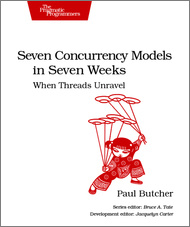
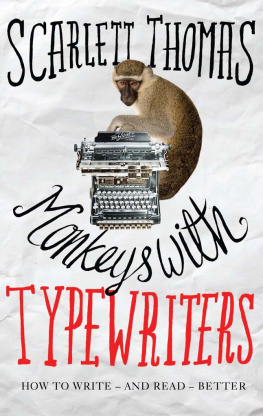





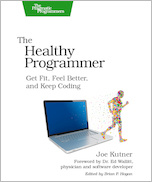
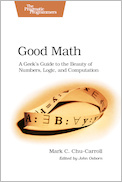
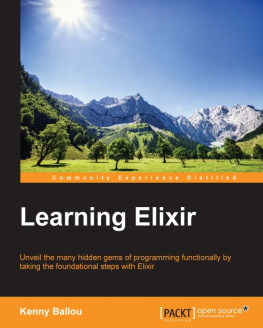
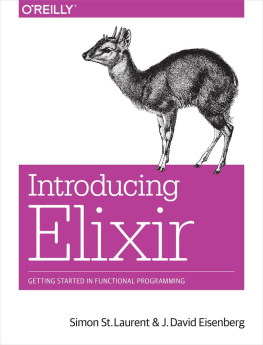

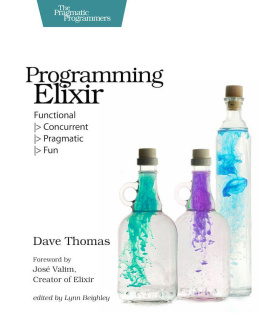
![Dave Thomas [Dave Thomas] - Programming Elixir 1.6](/uploads/posts/book/116896/thumbs/dave-thomas-dave-thomas-programming-elixir-1-6.jpg)
